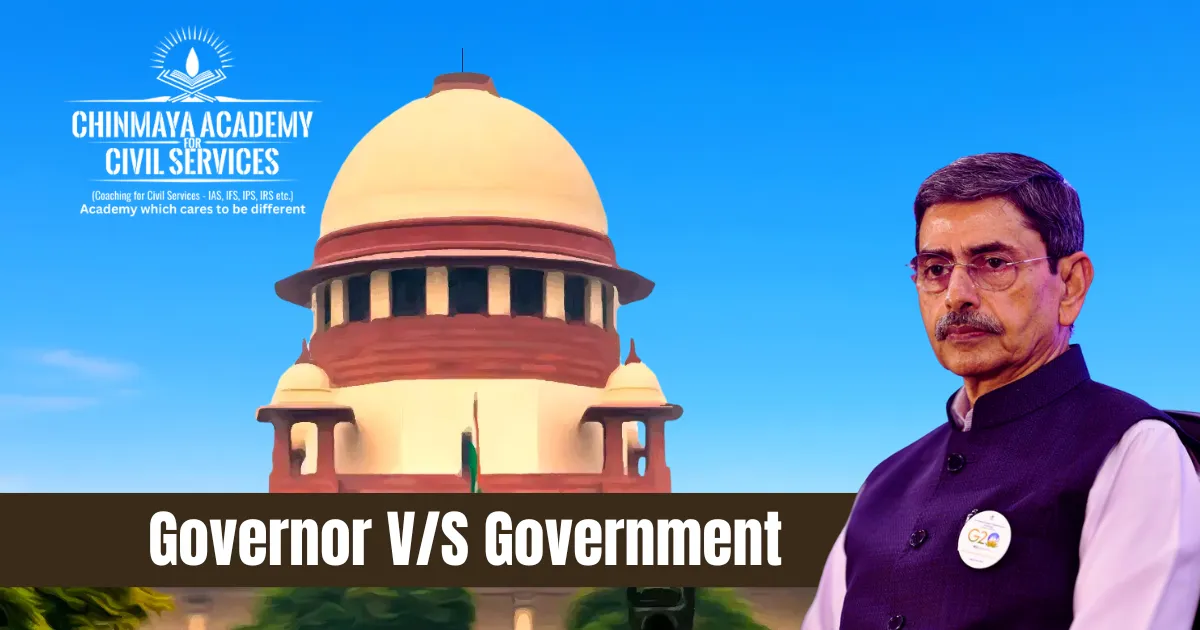
R. N. Ravi, the governor of Tamil Nadu, has “withheld” his approval of a number of bills that the legislative assembly of that state has enacted. This comes after the Supreme Court voiced “serious concern” over the Governor’s inaction on bills that were brought before him for ratification. The court voiced its disapproval of the Telangana, Punjab, and Kerala governors’ comparable delays.
What is stated in the Constitution?
The Governor, upon receiving a bill passed by a State Legislature, has four options under Article 200 of the Constitution:
- Give Assent: The Governor can simply grant their assent to the bill, allowing it to become law. This is the most straightforward course of action and is typically taken if the Governor agrees with the bill’s contents.
- Withhold Assent: The Governor can withhold their assent, effectively vetoing the bill and preventing it from becoming law. This option is used when the Governor believes the bill is unconstitutional or detrimental to the state’s interests.
- Reserve the Bill for the President’s Consideration: In certain cases, the Governor may reserve the bill for the consideration of the President. These cases typically involve bills that affect the powers of the High Court or those that have implications for multiple states. The President then decides whether to grant or withhold assent to the bill.
- Return the Bill to the Legislature for Reconsideration: The Governor may return the bill to the state legislature with a message requesting that they reconsider the bill or specific provisions within it. The legislature can either accept the Governor’s suggestions and amend the bill or pass it again in its original form, in which case the Governor must either give assent or reserve it for the President’s consideration.
According to the Supreme Court’s rulings in a number of cases, such as the Shamsher Singh case from 1974, the Governor does not use their discretionary powers when they refuse to sign a bill or send it back to the State Legislature. They must take action based on the Council of Ministers’ recommendations.
If a Private Members’ Bill is approved by the State Legislature and the Council of Ministers does not want it to become law, the situation known as “withholding assent” may occur.
- They would counsel the Governor to “withhold assent” in such a situation.
- This is improbable, though, as the majority of ministers in the Legislative Assembly, the Council of Ministers, would not permit the passage of a bill of that nature.
- Second, the new council may urge the governor to “withhold assent” if the current administration, whose bill has been approved by the legislature, collapses or quits before the governor signs it.
Any bill that is returned to the state legislature for review must also take the counsel of the minister into consideration. Nonetheless, governors have previously used their discretion to reject bills
- one such instance is the governor of Tamil Nadu’s handling of a bill that forbade online gambling.
- If the State Legislature passes the same bill again, the Governor will still sign it.
The governor must reserve certain bills, such as those limiting the powers of the Court of Appeals, for the consideration of the president.
- They can also, on the advice of ministers, reserve proposals in the parallel list that are contrary to Union law.
- Only in rare cases can the Governor exercise his discretion if he feels that the provisions of the Bill are inconsistent with the provisions of the Constitution and should therefore be left for the consideration of the President.
- At the same time, it should be noted that the constitution does not set a deadline in which the governor must make a decision.
Recommendations
The Sarkaria Commission said that only certain bills should be given a chance to be considered by the President, and only in certain cases that would be considered unconstitutionality.
- The Governor had to follow the advice of the ministers, and the President had to approve the bill within six months.
- If the President didn’t approve it, they had to tell the State Government why.
But the Punchhi Commission said the Governor had to take a decision within six months, but nothing has been done yet.
Solution
The politicization of the Governor’s position has been a chronic issue for India’s federal system. Numerous prominent figures, including C. N. Annadurai and Nitish Kumar, have advocated for the elimination of the Governor’s post.
- maintaining a symbolic head of the state executive, similar to the President for the union executive, is essential under our constitutional framework.
- the Governor, as an appointee of the central government, may be needed in times of crisis to preserve the nation’s unity and integrity.
- federalism is a cornerstone of our Constitution, and the Governor’s office should not diminish the authority of elected state governments.
The Supreme Court has highlighted the need for Governors and Chief Ministers to engage in introspection to improve the relationship between the central and state governments.
- To foster better cooperation, the Constitution could be amended to mandate consultation with Chief Ministers prior to Governor appointments.
- Additionally, the Punchhi Commission’s recommendation to empower state legislatures to impeach Governors could be implemented, providing a mechanism to remove uncooperative Governors.
- These changes would promote responsible collaboration and enhance the functioning of both central and state governments.
 Chinmaya IAS Academy – Current Affairs Chinmaya IAS Academy – Current Affairs
Chinmaya IAS Academy – Current Affairs Chinmaya IAS Academy – Current Affairs